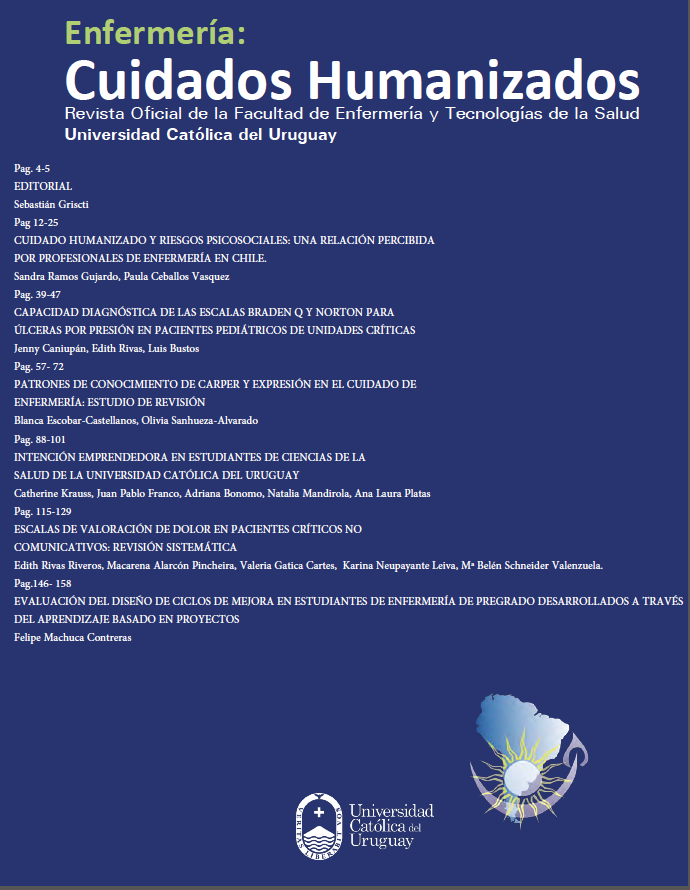Intención emprendedora en estudiantes de ciencias de la salud.
DOI:
https://doi.org/10.22235/ech.v7i1.1541Palabras clave:
Empleos, Ciencias de la Salud, Estudiantes, EducaciónResumen
Esta investigación es un estudio descriptivo que analiza la encuesta realizada a 1.088 estudiantes universitarios por parte del Centro de Desarrollo Emprendedor de la Universidad Católica del Uruguay en el año 2016, en el marco del estudio mundial anual del Global University Entrepreneurial Spirit Students‘ Survey (GUESSS) organizado por la Universidad de St. Gallen-Suiza, auditado por la consultora Ernst & Young. El foco principal es comparar las intenciones emprendedoras de los estudiantes universitarios de la Universidad Católica del Uruguay, en particular los estudiantes de Ciencias de la Salud, versus el resto de los estudiantes. Se plantea la hipótesis de que el nivel de intención de emprender de estudiantes de Ciencias de la Salud es menor respecto al resto de los estudiantes de dicha Universidad, siendo el entorno de la universidad un factor influyente en dicha variable. Tras un análisis cuantitativo de asociaciones estadísticas (pruebas chi-cuadrado) y diferencia de medias significativas, se concluye que dichos estudiantes presentan una menor intención emprendedora que el resto de los estudiantes de la universidad expresada en términos porcentuales, pero las diferencias no son estadísticamente significativas. Sin embargo, sí se constata que el entorno, el clima y las áreas de estudio de la universidad inciden favorablemente en la intención de emprender.
Descargas
Citas
2. Motivations, business planning, and risk management: entrepreneurship among university students. Ferreira, Aleciane, Loiola, Elisabeth y Guedes, Sonia. 2, 2017, RAI, Vol. 14, págs. 140-150.
3. The Effectiveness of the Entrepreneurship Education Program in Upgrading Entrepreneurial Skills among Public University Students. Din, Badariah Hj, Anuar, Abdul Rahim y Usman, Mariana. 2016, Procedia Soc Behav Sci, Vol. 224, págs. 117-123.
4. Prior education and entrepreneurial intentions: the differential impact of a wide range of fields of study. Teixeira, A.A.C y Forte, R.P. 2, s.l. : Springer, 3 de 2017, RMS, Vol. 11, págs. 353–394.
5. A comparison of entrepreneurial characteristics of business administration and health science undergraduate students at rangsit university. Chansom, Nakamol. s.l. : MAC Praque Consulting s.r.o, 2016.
6. Entrepreneurship Education in Health Care Education. Salminen, L., y otros. Article ID 312810, s.l. : Hindawi Publishing Corporation, 2014, Ed Res Int, Vol. 2014, pág. 8 pages.
7. Culture and National Conditions Facilitating Entrepreneurial Start ups. Baughn, Christopher y Neupert, Kent. 3, 2003, J Intern Entrep, Vol. 1, págs. 313-330.
8. Exploring entrepreneurial intentions in Latin American university students. Torres, Francoise, y otros. 2, 2017, IJPR, Vol. 10, págs. 46-59.
9. Assessing the impact of entrepreneurship education programmes: A new methodology. Fayolle, A., Gailly, B., & Lassas-Clerc, N. 30, 2006, JEIT, Vol. 9, págs. 701–720.
10. Nature and operation of attitudes. Ajzen, I. 2001, Ann Rev Psy, Vol. 52, págs. 27–58.
11. From entrepreneurial intentions to actions: Self-control and action- related doubt, fear, and aversion. Van Gelderen, M., Kautonen, T. y Fink, M. 2015, JBV, Vol. 30, págs. 655-673.
12. Aprendizaje social e intenciones emprendedores: un estudio comparativo entre México, España y Portugal. Sánchez, José Carlos. 1, 2009, Rev Latinoam Psicol, Vol. 41, págs. 109-119.
13. Entrepreneurial intentions: Applying the theory of planned behaviour. Krueger, N.F. y Carsrud, A. L. 1993, Entrep Region Dev Jour, págs. 315-330.
14. Theory of Planned Behavior. Ajzen, I. 2, 12 de 1991, Org Behav Hum Decis Process, Vol. 50, págs. 179-211.
15. Sieger, P., Fueglistaller, U. y Zellweger, T. Student Entrepreneurship Across the Globe: A Look at Intentions and Activities. St.Gallen : KMU-HSG, 2014.
16. A diagnostic approach to understanding entrepreneurship in health care. McClearly, Karl A., Rivers, Patrick A. y Schneller, Eugene S. 4, 2006, JHHSA SPRING, Vol. 28, págs. 551 - 577.
17. The Impact of an Entrepreneurship Education Program on Entrepreneurial Competencies and Intention. Sánchez, José C. 3, 2013, JSBM, Vol. 51, págs. 447–465.
18. Neck, Heidi M., Greene, Patricia G. y Brush, Candida G. Teaching Entrepreneurship. A Practice-Based Approach. Cheltenham : Edward Elgar Publishing Limited, 2014.
19. Entrepreneurship education: Process, method or both? Welsh, Dianne, Tullar, William y Nemati, Hamid. 2016, Journal of Innovation & Knowledge, Vol. 1, págs. 125-132.
20. Sieger, P, Fueglistaller, U y Zellweger, T. Student Entrepreneurship 2016: Insights From 50 Countries. St.Gallen/Bern : KMU-HSG/IMU., 2016.
21. The ‘entrepreneurial turn’ and regional economic development mission of universities. Goldstein, Harvey A. 2010, Ann Reg Sci, Vol. 44, págs. 83-109.
22. Exploring the antecedents of entrepreneurial intention on Turkish university studens. Serra, E. y Kabadayi, Z. Doganay, A. 2014, Procedia Soc Behav Sci, Vol. 150, págs. 841-850.
23. The theory of planned behavior and prediction of entrepreneurial intention among chinese undergraduates. Yang, Jianfeng. 3, 2013, Soc Behav Pers, Vol. 41, págs. 367-376.
24. Desarrollo de la capacidad emprendedora en la oferta educativa a nivel superior. Soto, Raymundo. 42, 2012, Gest y estra, págs. 85-93.
25. Entrepreneurship education and entrepreneurial intention: Do female students benefit? Westhead, P y Solesvik, M. 2016, ISBJ, págs. 979-1003.
26. Las barreras a la actividad emprendedora en Uruguay - Primera parte - El nivel de actividad emprendedora por género y motivación. Veiga, L., Chaquiriand, I. y Bartesaghi, A. Montevideo : IEEM, Agosto de 2016, pág. 30.
27. Krauss, Catherine, y otros. GUESSS: Reporte de Uruguay. [En línea] 2016. [Citado el: 01 de 06 de 2017.] http://www.guesssurvey.org/resources/nat_2016/GUESSS_Report_2016_Uruguay.pdf.
28. Massaro, F., y otros. Análisis de las intenciones emprendedoras de los estudiantes universitarios de Ingeniería de la Universidad Nacional de Lomas de Zamora a partir de la encuesta GUESSS. Revista Ingenium. [En línea] julio de 2015. http://www.ingenieria.unlz.edu.ar/ingenieria/wp-content/uploads/2015/06/revistaingenium2.pdf.
29. Development and cross-cultural application of a specific instrument to measure entrepreneurial intentions. Liñan, F. y Chen, Y.W. 2009, Entrepren The and Prac, págs. 593-617.
30. Empreendedorismo para Todos: Desafios e oportunidades para aperfeiçoar a educação superior brasileira. Lima, Edmilson, y otros. Rio de Janeiro : s.n., 2012. ENANPAD 2012. págs. 1-18.
31. Putting Entrepreneurship Education Where the Intention to Act Lies: An Investigation Into the Impact of Entrepreneurship Education on Entrepreneurial Behavior. Rauch, Andreas y Hulsink, Willem. 2, 2015, AMLE, Vol. 14.
32. Krueger, N. http://papers.ssrn.com/. Entrepreneurial Resilience: real & perceived barriers to implementing entrepreneurial intentions. [En línea] 08 de 06 de 2008. [Citado el: 10 de 03 de 2016.] http://papers.ssrn.com/sol3/papers.cfm?abstract_id=1155269.
33. Kyrö, Paula y Carrier, Camille. The dynamics of learning entrepreneurship in a cross-cultural university context. s.l. : University of Tampere, Faculty of Education, Research Centre for Vocational and Professional Education., 2005. pág. 382. 951446379X, 9789514463792.
34. Management of Entrepreneurship Education: a Challenge for a Performant Educational System in Romania. Vilcov, Nicoleta y Dimitrescu, Mihaela. 2015, Procedia Soc Behav Sci, Vol. 203, págs. 173-179.
35. An exploratory study of technopreneurial intentions: A career anchor perspective. Lee, S.H. & Wong, P.K. 1, 2004, JBV, Vol. 19, págs. 7–28.
Descargas
Publicado
Cómo citar
Número
Sección
Licencia
Derechos de autor 2018 Enfermería: Cuidados Humanizados

Esta obra está bajo una licencia internacional Creative Commons Atribución 4.0.

















